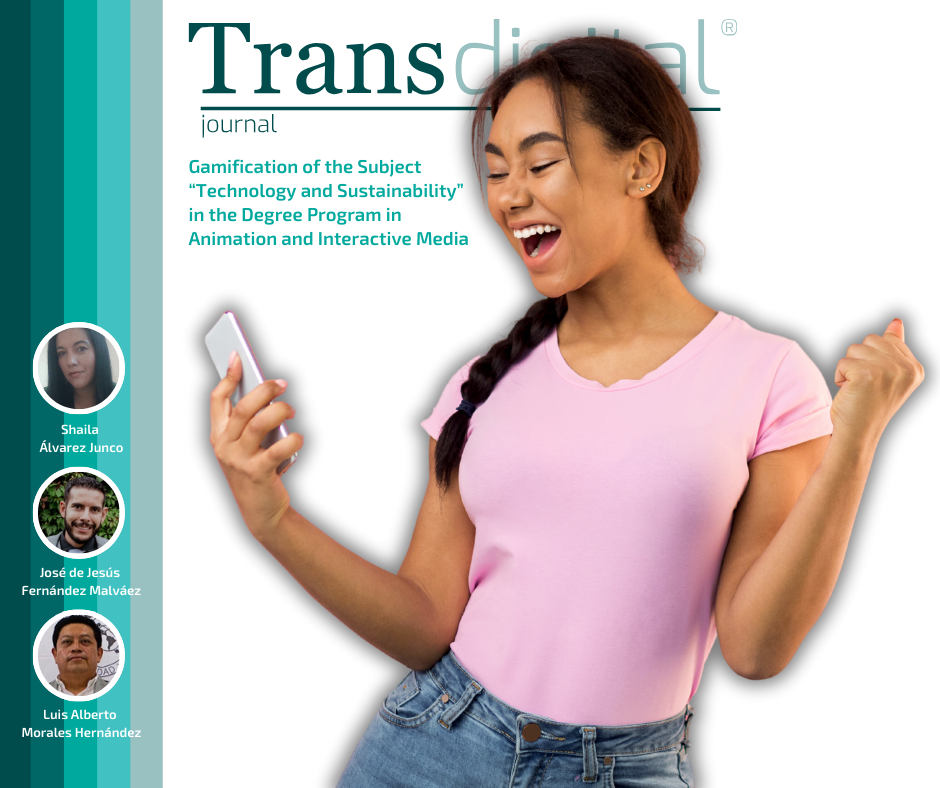Gamification of the subject “Technology and Sustainability” in the Degree Program in Animation and Interactive Media
DOI:
https://doi.org/10.56162/transdigital276Keywords:
learning, graduate attribute, teaching, gamificationAbstract
The bachelor’s degree in digital Animation and Interactive Media (LADMI), offered at the Autonomous University of Querétaro, Mexico, is an educational option that combines technology, sustainability, and creativity. The Technology and Sustainability course is part of the humanistic axis of the LADMI. This study describes the course gamification proposal. While sustainability is not the focus of the program, there is an opportunity to integrate sustainable practices into the creative process and foster a responsible mindset towards the environment and society. It begins with the description of the subject. The design explains the desirable profile and the contribution to the student's graduation attributes upon completion of the course, as well as the relationship it may have with interest groups. It is proposed to gamify by adjusting to the Positive Emotions, Engagement, Relationships, Meaning and Achievement (PERMA) model. Finally, collect some opinions about the model for later improvements.
References
Bartle, R. (2023). Hearts, clubs, diamonds, spades: players who suit MUDs. https://mud.co.uk/richard/hcds.htm#1
Diago Egaña, M. L., Cuetos Revuelta, M. J., & González González, P. (2018). Análisis de las herramientas de medición de los Estilos de Aprendizaje. Revista de Investigación Educativa, 381(julio-septiembre) 95-131. https://doi.org/10.4438/1988-592X-RE-2017-381-382
España, G. (2023). México: La Economía Naranja es el secreto exportador mejor guardado. Forbes. https://www.forbes.com.mx/mexico-la-economia-naranja-es-el-secreto-exportador-mejor-guardado/
Ferrusquía, R. M. (2022). México, potencia creativa y los retos que la frenan. Forbes. https://www.forbes.com.mx/mexico-potencia-creativa-y-los-retos-que-la-frenan/#:~:text=%E2%80%9CM%C3%A9xico%20es%20el%20quinto%20proveedor,diversos%20sectores%20de%20esta%20industria.
García Cruz, R., Cáceres Mesa, M. L., & Bautista Díaz, M. L. (2019). Convivencia y bienestar: categorías necesarias para la educación positiva. Revista Universidad y Sociedad, 11(4), 177-183. https://rus.ucf.edu.cu/index.php/rus/article/view/1287
Little, P., & Mcmillan, M. (2014). Graduate Attributes: Development and Testing. Journal of Problem-Based Learning, 12-21.
Madeson, M. (2017). Seligman’s PERMA+ Model Explained: A Theory of Wellbeing. PositivePsichology.com. https://positivepsychology.com/perma-model/
Perdomo Vargas, Iván Ricardo, & Rojas Silva, Julie Alejandra. (2019). La ludificación como herramienta pedagógica: algunas reflexiones desde la psicología. Revista de estudios y experiencias en educación, 18(36), 161-175. https://dx.doi.org/10.21703/rexe.20191836perdomo9
UAQ. (2023). Licenciatura en Animación y Medios Interactivos de la Facultad de Ingeniería. Página web oficial de la Universidad Autónoma de Querétaro. https://ingenieria.uaq.mx/index.php/oferta-educativa/licenciaturas/licenciatura-en-animacion-digital
UAQ. (2017). El Modelo Educativo Universitario. Universidad Autónoma de Querétaro. https://planeacion.uaq.mx/docs/meu/El-Modelo-Educativo-Universitario-MEU.pdf
Vergara, D., Gómez-Vallecillo, A., Fernández-Arias, P., & Antón Sancho, Á. (2023). Gamification and Player Profiles in Higher Education Professors. International Journal of Game-Based Learning, 13(1), 1-16. https://doi.org/10.4018/IJGBL.323449

Downloads
Autor de correspondencia
El autor de correspodencia se identifica con el siguiente símbolo: *Published
How to Cite
License
Copyright (c) 2023 Shaila Álvarez Junco, José de Jesús Fernández Malváez, Luis Alberto Morales Hernández

This work is licensed under a Creative Commons Attribution 4.0 International License.
All articles in Transdigital are licensed under a Creative Commons Attribution 4.0 International License. Authors hold the copyright and retain publishing rights without restrictions.









